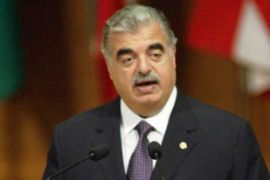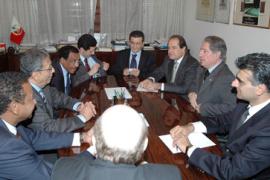Hariri inquiry in ‘critical stage’
Serge Brammertz cites progress in gathering crime scene evidence in interim report.

Published On 19 Dec 2006
The Belgian prosecutor noted that his panel’s objective was “to collect evidence that will be admissible before a future [international] tribunal” that is to try suspects in the al-Hariri murder.
He said that he could not say when his probe would be completed, noting that “an investigation of this complexity takes time”.
Suspected bomber
The UN report, the sixth to look into the February 14, 2005, bombing that killed al-Hariri and 22 others in the commercial heart of Beirut, sought to establish the geographic origin of the suspected bomber, an unidentified male whose “complete tooth and other biological parts found on the crime scene” are being analysed by experts.
The first phase of analysis showed that “the individual did not spend his youth in Lebanon, but was situated there in the last two to three months before his death, the report said.
“The report discusses the type of area in which the individual lived during the last 10 years or so of his life, although at this stage no specific region can as yet be derived from the analysis,” the panel said.
The inquiry commission said it “will continue to request Syria’s full co-operation, which remains crucial to the swift and successful completion of its work”.
Mehlis inquiry
Brammertz’s German predecessor Detlev Mehlis had implicated in al-Hariri’s slaying senior officials from Syria, which for decades was the power broker in its smaller neighbour.
Damascus strongly denies any connection with al-Hariri’s slaying. Syria’s UN envoy Bashar al-Assad on Monday noted that the Brammertz report “clearly shows that Syria’s co-operation has been satisfactory and has come in a timely way”.
While pledging continued Syrian co-operation, he warned: “The greatest risk facing this investigation is that some parties in our region and beyond … are exploiting this investigation in order to reach politicised conclusions which have no relationship whatsoever with the requirement of an investigation and which are not based on any proof.”
Formal requests
Brammertz said that since last September 15, 10 new formal requests for help had been sent to five states other than Syria, bringing the total number of such requests to roughly 60 since March.
He said that while most states had responded positively, “the lack of responsiveness by certain [unnamed states] has impeded or slowed down the work of the commission on several fronts”.
The Belgian prosecutor meanwhile said that a final report by outside experts endorsed his panel’s assumptions that the attack consisted of only one blast of an RDX-based high explosive used in military and industrial application.
Brammertz also pointed to a “considerable number of links between the Hariri case and six of 15 other attacks against anti-Syrian Lebanese personalities or entities”.
Among the 15 cases, which Lebanese authorities are investigating with UN assistance, is the assassination of Lebanese industry minister Pierre Gemayel on November 21.
Last June, the Security Council extended the mandate of the Brammertz-led inquiry panel until June 15, 2007, at the request of the Lebanese government.
Opposition demand
Meanwhile, on the ground, Lebanese opposition forces on Monday called for a new election law and early general elections to resolve the ongoing political crisis.
In a statement, the opposition said it was demanding “first of all a new law for parliamentary elections and, second, early parliamentary elections”.
 |
|
Moussa is expected to resume his mediation |
The various opposition factions held a meeting on Monday at the house of Omar Karami, a former prime minister, and decided to give priority to the demand for early legislative elections.
Karami said the opposition groups will co-operate with Amr Mussa, the Arab League secretary-general who has been trying to broker a political settlement.
“The opposition will study an escalation of the campaign after due consideration if the government continues its manoeuvres,” Karami said.
Moussa is due in Beirut on Tuesday to meet rival Lebanese politicians.
He held talks on Sunday with King Abdullah and other top leaders in Saudi Arabia, which supports the government of Fouad Siniora, the prime minister.
Source: AFP